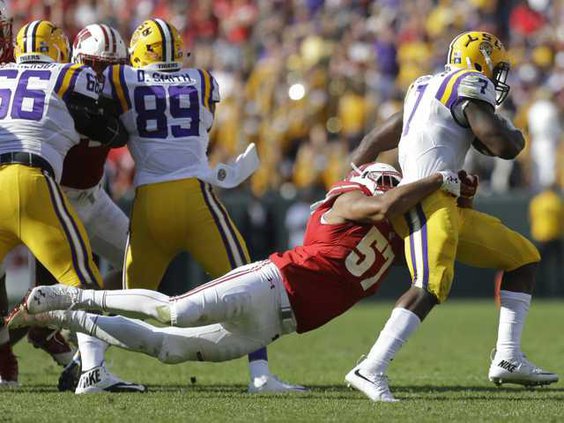Now that college football season is finally here, there is only one thing that can top watching dozens of games each weekend.
That, of course, would be arguing with others about how each team stacks up to another.
This time-honored tradition is fun for many, but it’s also serious business when the people doing the arguing are the ones who decide which teams will make it into the four-team playoff to get a shot at the national championship. In addition to making the final choice about which teams get to play on and which teams can check their title aspirations at the postseason door, there are millions of revenue dollars and untold amounts of publicity that are rather arbitrarily decided on.
The general public is left to assume that this handful of people in the selection committee will get things right and choose the four most deserving teams. This is where the current system hits a snag. No matter what parameters are put in place, the final decision boils down to regular people - influenced by many factors - having to make a decision that is rarely crystal clear.
Not much can be done about many of the variables that factor into preferences for one team’s resume over that of another, but I can think of one small change that will help.
Let’s save the first polls of the year for October.
Every year, we see teams crash and burn after beginning the season with a top-10 ranking and visions of a national title dancing in their heads. Similarly, each new season - by its end - introduces us to a team that has proven to be among the best in the nation despite not being given any attention in the preseason.
These examples make for interesting storylines, but things get much more serious when the consequences are considered of where teams finish relative to a starting point as measured by a preseason poll.
When some conferences (SEC, I’m looking in your direction) get to start each season with two-thirds of the league ranked, it’s impossible for them to do anything but succeed. Every win is a plus, but many losses also receive the benefit of a doubt when people are programed to treat them as an acceptable circumstance of playing in a great league.
Sometimes, that level of understanding is warranted. But take into account weeks like this one.
A top-5 LSU team was dominated by an unranked Wisconsin team. A top-10 Tennessee team could barely move the ball and No. 25 Florida got all it wanted from Massachusetts - one of the worst FBS teams in the country over the last few years.
This can all be explained away by calling it a one-off scenario, but consider how things can play out from here. Simply because of a high preseason ranking, teams who bombed in Week 1 are still hanging around the polls and still have three months to rebuild their resumes.
Conversely, the teams who have seemingly overachieved in the first week of play might turn out to be much better than expected, but will be hampered by the unnecessary burden of low expectations coming into the season.
There are plenty of examples of this throughout the last couple of decades.
The 2004 Auburn Tigers may well have been the best team in the country and finished with a perfect 13-0 record. Too bad they started the season with a lower ranking than USC and Oklahoma, so they were never allowed to move high enough in the rankings to make the national championship game.
And that was just when the computers were deciding things.
In the first year of the new playoff system - and with the selection committee deciding the final four teams - both TCU and Baylor looked dominant throughout the season in rolling to respective 11-1 records. Both spent time in the committee’s top-4 rankings released with each passing week, but it was Ohio State - which lost early, but was perceived to be a stronger team to begin the year - that lept ahead of both the Horned Frogs and Bears in the final poll with little in the way of reasoning for the jump.
There is no perfect way to determine a national champion. A playoff a four teams - and hopefully growing to eight soon enough - does a fine job of letting great teams decide things on the field, but deciding on a playoff field will always be subjective and up for debate.
The best thing to do in order to give everyone a fair shake in this final selection process is to at least start out on even ground. If no polls were released until October each season, just imagine how things would be different.
Surprising teams might debut close to the top-10 instead of finally gaining entry into the final slots as many voters still hold out doubt. And instead of seeing two-loss teams hanging around - believe me, there will be one in a few weeks - as dead weight just because some voters want to hang on to their preseason evaluations, there would be plenty of room for all of the teams who may have suffered a loss, but who also have a marquee victory to their name.
College football is already a vast landscape of inequality, with schools who have millions to spare for endless renovations and gadgets annually topping programs that are just trying to balance the books.
The least that can be done is to recognize upstart smaller teams for what they’re accomplishing on the field and to stop letting the traditional powers put forth mediocre efforts and know that they’ll still be in the running at the end of the season.
Mike Anthony may be reached at (912) 489-9408.
Do away with these early season rankings





